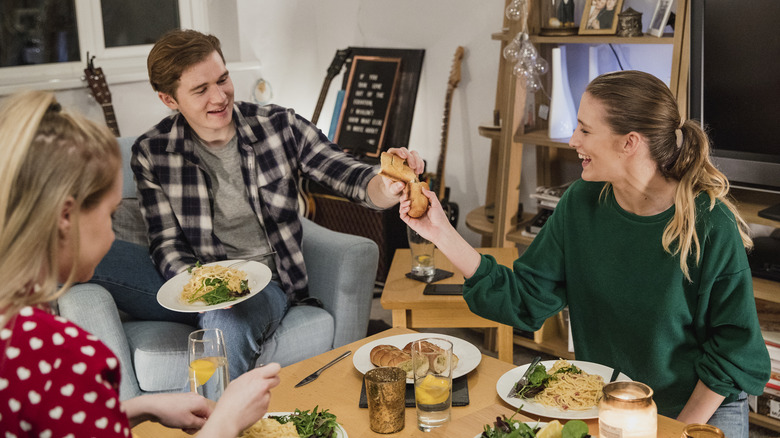11 Signs That It Might Be Time To Share A Place With Your Partner
The dating landscape in the United States has been shifting for years. In 1960, the average man married before his 23rd birthday, while the average woman tied the knot at just 20 years old, per a 2020 report from Bowling Green State University. As the years have gone on, though, more and more people have opted out of early marriages and chosen to pursue other lifestyles. According to a 2019 investigation by the Pew Research Center, a record-breaking 9% of unmarried U.S. adults have chosen to cohabit with a romantic partner. This is more than double the number of cohabitating partners from 1990.
In an interview with UVA Magazine, University of Virginia sociologist Allison Pugh explained that this transition towards moving in together is positive. "I do think we [as a society] are making up new ways to be together ... We're seeing people innovate culturally [by inventing new types of relationships] in response to massive social changes." However, while these social changes may be happening quickly, individual couples must know whether they're ready to share a place. Before co-signing a lease with one's partner, it can be a good idea to review the signs that it's time to take that next step.
1. You agree on what sharing a place means
Sharing a place can be a huge step forward in any relationship. However, before that happens, both partners must be on the same page about what this decision means for their future. According to a 2019 investigation by the Pew Research Center, 66% of people consider cohabitation "a step toward marriage," while the remaining 34% hold a different opinion. Because of this, both partners need to share their views on shacking up before it happens. In practice, this means initiating an honest conversation about the purpose of moving in together to ensure everyone is on the same page.
The good news is that these conversations, while potentially awkward, can pay off big time. Ana Mascara, a doctoral student of psychology with an active YouTube channel, has not hesitated to express the impact of these heart-to-hearts on budding relationships. In her video "The Psychology of Cohabitation," Mascara explains: "When people do see [living together] as a step toward marriage, that is when they tend to stay together the longest. But people that are kind of unsure about whether they are going to commit to their partner, those are the ones that don't end up working out so much." In that sense, the massive Defining The Relationship conversation can be a crucial part of determining if it's time for a couple to co-sign an apartment.
2. You aren't afraid to be vulnerable together
In the opening scene of the romantic comedy "Bridesmaids," Kristin Wiig sneaks out of bed so as not to wake her sleeping partner. She creeps to the mirror, applies makeup, and slithers back between the sheets. When her bedmate finally opens his eyes, Wiig's character is huddled under the blankets with a perfectly made-up face, as if she is about to belt the Beyoncé lyrics: "I woke up like this."
While this movie scene is hilarious, it does highlight a major relationship red flag: A reticence to be vulnerable with one's partner. According to clinical psychologist Alexandra Solomon, allowing oneself to be vulnerable is essential to deciding to share a place. In a piece for Psychology Today, Solomon wrote, "I think the hardest thing about moving in together is that there's nowhere to hide. You wake up feeling overwhelmed by the state of the world — your partner is there to see it. You receive negative feedback from your boss ... — your partner is there to see it."
Basically, couples who live together cannot maintain the illusion that they are perfectly polished. For a relationship to work, both parties must be comfortable revealing their authentic selves. As renowned psychologist Richard Firestone explained in an interview with Psyche Alive, "[W]hat I recommend is that you be the fool; that you take a chance on life, that you invest fully in people, that you invest your trust in other people."
3. You know how to work together on logistics
Dating can feel magical. It's easy to get swept up in candlelight pizza nights, elaborate birthday surprises, and even Netflix marathons. However, the trials and tribulations of daily life aren't exactly romantic. Instead, most young people are too busy navigating the ins and outs of "adulting" (via Time) to recreate even an ounce of romance à la "Lady And The Tramp." As a result, couples that live together end up adulting together. And part of managing the phone plans, chore wheels, and electricity bills of a shared life is getting comfortable with being logistics buddies.
According to New York-based therapist Jor-El Carballo, couples who want to share a place should understand that they must tackle logistics together. In an article for Talkspace, Carballo detailed how tricky it is for partners even to choose a place to share: "From residence size, [to] price, [to] location, ... there is a lot to figure out!" However, Carballo believes couples can navigate these difficulties using a few social tools. "If you're moving in with your partner, in order to be successful, it's going to require the spirit of collaboration and compromise for both of you," he wrote. The therapist explained that moving in together will be easier if both partners are willing to treat each other as teammates: "Start these conversations with the spirit of collaboration so that you can begin your cohabitation journey on the right foot."
4. You're not afraid to discuss finances
It's no secret that money is a taboo subject. Discussing finances, salaries, and debt with a partner can be awkward. And according to sociologist Rachel Sherman, this is fairly normal. In an interview with The Atlantic, Sherman explained, "[P]eople often just feel bad about how much money they have ... [N]ot talking about it makes that feeling of badness go away." As a result, many couples try to avoid the discussion entirely. One report by Fidelity found that a whopping 34% of couples had at least one partner that couldn't correctly guess the yearly earnings of their better half.
Unfortunately, however, a lack of financial transparency isn't great for couples hoping to share a place. In an interview with CNBC, financial advisor Kristin O'Keeffe Merrick explained why it's so important for partners to chat about their finances. "Money communication is incredibly important in a long-term relationship ... I have seen several cases of 'financial irresponsibility' that have ruined relationships," she told the outlet.
The good news is that there are easy ways to open a casual money conversation with one's partner. As financial therapist Amanda Clayman told NPR, "I find that money comes up pretty naturally if we let it, that it gets harder the more we think of it as a very special talk about money." According to Clayman, the best way to initiate a financial chat is to ask your partner: "How comfortable do you feel being open about money?"
5. But you're not in it for the money
Being in a relationship "for the right reasons" might sound like a cliché from "The Bachelor." However, many couples do consider sharing a place for financial motives rather than romantic ones. And the reason is that the pay-off for cohabitating can be huge. A 2019 report by the Los Angeles Daily News found that the average person could save $528.25 per month by moving in with their partner. However, while this caliber of savings may be tempting, living together for financial reasons could have negative consequences. In an interview with Refinery29, psychologist Charlotte Dunsby-Ferguson analyzed the downsides of using a relationship to save money. "On the whole, couples [who live together] get a better deal when it comes to living costs, but when funds are intermingled, it can be much more difficult to leave a relationship," she told the outlet. In other words, couples who live together to save money risk getting stuck in an unhappy relationship because they can't afford to leave.
This is exactly what happened to an anonymous person who published a piece for The Financial Diet under the multi-contributor pseudonym The Financial Confessions. "I really am staying in a relationship for financial reasons ... I need my boyfriend for the financial stability he provides," the anonymous contributor wrote. Consequently, the person in question feels "trapped." The best way to avoid this situation is to move in with one's partner for motives other than money.
6. You know how to work through conflict
No relationship is perfect, and for the vast majority of couples, arguments are inevitable. While it's no fun to get into a lovers' quarrel, the good news is that it's normal for couples to experience moments of discord. As psychology professor Dr. Gary Lewandowski wrote in a piece for Psychology Today, "The fact that you and your partner argue ... is not an indictment on you as a couple ... Conflict is unavoidable and ultimately part of a strong relationship."
However, although it's normal for couples to disagree, there are unhealthy ways for partners to express their opposing views. Before deciding to share a place, partners should ascertain that their disagreements aren't toxic. Per a conversation between family therapist Nicole Richardson and Elite Daily, some unhealthy argument patterns may include name-calling or lashing out. "[I]f you or your partner feels the need to cause pain in order to feel heard, that can really do damage to the trust and safety in the relationship," Richardson warned.
Luckily, there are plenty of ways that couples can engage in healthy arguments, as well. Licensed family therapist Steph Anya recommends that couples approach their disagreements with the intention of understanding each other. In an episode of her YouTube show "Steph Anya, LMFT," she shares, "The most important element of communication, especially when you're having a disagreement with your partner ... is having each person walk away with a clearer understanding of the opposing person."
7. You genuinely enjoy spending time together
This one might sound like a no-brainer. After all, living together involves spending a lot of time together. And that works better when all parties enjoy each other's company. Nonetheless, as obvious as this all may seem, a lot of young people decide to share a place due to social pressure rather than romance. According to Match.com's 2017 survey of singles in America (via Entity Mag), millennials are "177% more likely to feel an overwhelming pressure to get married" compared to past generations. As one single American guy called Steve confessed to Insider, "I've experienced pressure to settle [down] ... From social circles, [the pressure] has been more implicit and a result of my peers and friends partnering up and the change in lifestyle that comes with that — i.e., less going out, fewer 'singles activities' and more 'partner activities' like double dat[ing]." Because of this strong culture surrounding serious relationships, many millennials might decide to live with a partner before they are ready.
To avoid this mistake, couples must reflect on how the other person makes them feel before shacking up. If both parties feel safe with each other, it could be time for them to share a place. Dr. LeslieBeth Wish told Elite Daily, "You are surprised at how calm you feel [when you're in love]. You are no longer jumping over the waves, but instead, you are wading and floating in a peaceful pool."
8. You're not afraid of the ick
The "ick" has become an iconic part of dating disappointments. A piece by Rhik Sammadder of The Guardian defines the phenomenon: "An ick is a point at which your initial attraction to a person flips into a feeling of disgust." The "ick" could happen at any point in a dating relationship, but generally, it occurs early on. As Sammader recounted in his essay, "One of [my friends] told me she got the 'ick' off a boy who didn't use pillowcases. Another from one who wore a lime green shirt." Basically, the "ick" kicks in when someone's quirks lead their once-interested partner to feel an utter lack of attraction.
Moving in together, however, can give the "ick" a whole new meaning. Partners who share a place inevitably discover more quirks about each other, and not all of them are pleasant. The good news is that couples don't have to be afraid of the "ick" if they're willing to do the work. According to psychological scientist Raquel Peel, that sudden repulsion is often about the partner who gets the ick. In a piece for The Conversation, Peel wrote, "[I]f an unexpected behavior is suddenly turning you off, ask yourself what might be happening for you; their behavior might have triggered a long-term unresolved issue for you." A willingness to work through these individual issues can help both partners see and love each other's quirks without letting the "ick" get in the way.
9. Your partner doesn't limit your autonomy
In a healthy relationship, it's normal for two people to spend a lot of time together. However, it is also healthy for each person to have their own opinions, activities, and interests. As relationship expert Mara Opperman revealed in an interview with Bustle, "It's very important to have independence in a relationship ... It's essential to have your own sense of autonomy while feeling you can depend on each other." In practice, this means that both partners feel safe enough in the relationship to pursue their own career goals and hobbies. For those looking to achieve this, therapist Gracie Landes offers some advice: "Get time on a regular basis to do something on your own that you enjoy and that give[s] you energy. Have hobbies or interests you can bring back to share with your partner" (via Bustle).
If partners both feel free to enjoy this sense of autonomy, they might consider moving in together. On the flip side, however, partners who already feel totally "absorbed" by their relationship might not be ready for that next step. According to the governmental program Relationships Australia, one classical sign of an abusive relationship is a partner who won't let their better half "make plans without them." Another sign is making a partner "feel guilty for spending time with family and friends." If one or both partners have limited autonomy within a relationship, cosigning a lease might not be the best idea.
10. You are starting to bother your roommates
Many young Americans share housing expenses by living with roommates. According to a 2015 report by the US Census Bureau (via The Atlantic), about one in every four young adults lives with at least one roommate. And while this arrangement might be great when all parties are single, adding a partner — aka, an unofficial "extra roommate"– into the mix can be complicated. This is because most couples enjoy doing, well, couples' activities in their homes, while their roommates might not feel the same way. One Brooklynite named Mike had a particularly bad experience sharing an apartment with a pair of expressive love birds. "They do this thing where they kiss silently for long-drawn-out periods, and neither of their heads move[s]. That's kind of gross and weird to me," Mike told Glamour.
When a couple starts noticing that maybe they need their own space, that could be a sign that it's time to find a place together. Couples that still need to live with a roommate for financial reasons, in turn, should search for a roommate that is open to living with a couple from the very beginning. This is because simply moving one's new partner into a long-standing roommate relationship is just plain awkward. According to psychologist Dr. Alisa Ruby Bash, this is also a recipe for "resentments" over issues like rent (via Architectural Digest). Overall, the best way to avoid these dynamics is to find a new living situation.
11. You basically live together already
Sometimes, life is actually as simple as it seems. If partners feel that they have found their match, moving in together will likely feel like the natural next step. And a couple that has been consistently sleeping over for months will likely find that deciding to share a place doesn't seem like a huge leap. According to eHarmony's Chief of Advice, Jeannie Assimos, it's a good sign when this type of compatibility doesn't feel forced. "When you've found The One, the relationship just flows. Things are fairly easy," Assimos told FashionBeans. "You feel at home, totally comfortable, and are able to be yourself."
Nonetheless, couples who are planning to move in together should recognize that their decision will ultimately change their relationship. As London psychologist Dr. Becky Spelman told Stylist, "It can be easy for people to assume that everything will be consistent to how it was before you move in with a partner – but there will often be surprises when you start to cohabit." This change doesn't have to be a negative thing. At the end of the day, many couples find that living together draws them closer together.











